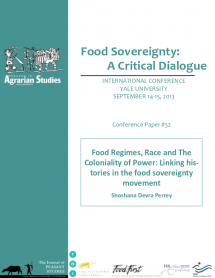Ideas into movement
Boost TNI's work
50 years. Hundreds of social struggles. Countless ideas turned into movement.
Support us as we celebrate our 50th anniversary in 2024.

This paper centers the food regime as a critical tool for understanding state hegemony, and invokes the introduction of racial categorization to further extend the powerful role of states’ formations historically.

This paper centers the food regime as a critical tool for understanding state hegemony, and invokes the introduction of racial categorization to further extend the powerful role of states’ formations historically. To do this I present the food regimes analytical tool and characterize the coloniality of power thesis, to argue that a better understanding of state formation in modern times is achieved by unifying both race and food regimes together, rather than thinking of them as two detached concepts.
First I characterize Aníbal Quijano’s Coloniality of Power thesis, which explains how the categorization of people by racial identities was a novel process of the conquest of the Americas, used to exert power and develop a capitalist hierarchy over labor based on categories of race.
Then, I define and problematize Friedmann and McMichael’s food regime analytic, discussing a few criticisms brought forth from other scholars. The food regime analytical tool explains how the state hegemony controls food systems through industrial agriculture marketing and policy-making.
The result of this paper shows how the integration of Coloniality of Power alongside a food regimes analysis have combined to support the genesis of the food sovereignty countermovement. Food sovereignty, which arguably is an ideology more than a process in it self, supports the political, social and economic rights of people to control their own food systems. It counters the hegemony of food regimes by integrating equality of race, gender, religion and class into the agency afforded to people to resist corporate and state hegemony of food systems. It follows that those people and groups whose rights and agrarian livelihoods have been most direly challenged have organized together to define food sovereignty. Thus, this paper characterizes the changing frame of reference that the food sovereignty movement advances to counter state hegemony, racial categories and labor relations in food regimes.
Shoshana Devra Perrey is an NSF Fellow As an NSF Fellow, Ms. Perrey did participatory research in agroecology with farmers in Mexico and Madagascar. She earned a B.A. in Food Policies, Institutions and Culture from Mills College, designed a campus farm, and was a Food First intern. Her master’s thesis is on alternative education in international farmer training. She is coordinating a community-produced mural on wild edibles in Ithaca, NY for the Food Justice Summit.